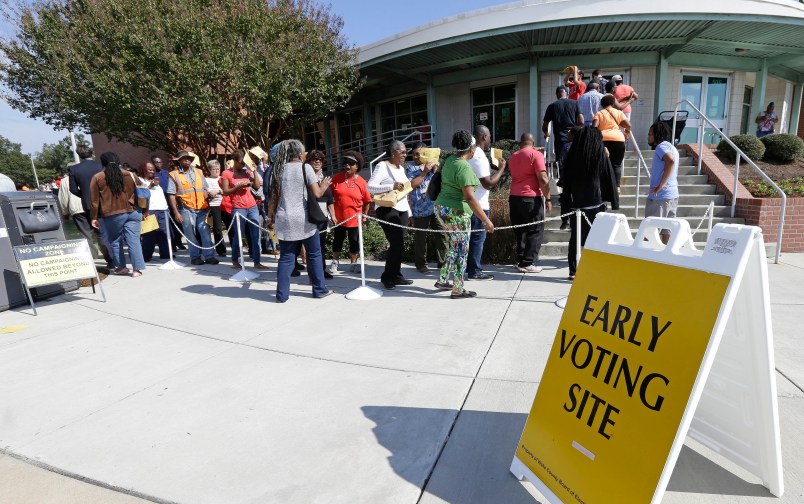After lobbying local elections officials to limit the early voting opportunities that are popular among African Americans, North Carolina’s Republican Party bragged Sunday about this year’s decrease in black early voting turnout.
A state GOP press release on the state’s early voting numbers highlighted that African American early voting turnout was down by 8.5 percent from 2012.

Back in August, the News and Observer reported on an email sent by North Carolina GOP executive director Dallas Woodhouse to local elections officials urging them to limit early voting opportunities, including Sundays, which are used disproportionately by African Americans, and particularly those participating in black churches’ “soul to poll” voter drives.
“Our Republican Board members should feel empowered to make legal changes to early voting plans, that are supported by Republicans,” Woodhouse wrote. “Republicans can and should make party line changes to early voting.”
Since then, more emails from GOP operatives making similar arguments to elections officials emerged. The county elections boards — which are made up two-to-one of GOP appointees — were debating their early voting plans for the extra week of voting effectively restored by an appeals court decision over the summer. More than a few of those officials took the state party’s advice and proposed plans that would have severely limited early voting opportunities, particularly for black and student voters. Civil rights groups challenged many of those plans, and the state elections board ameliorated some, but not all, of the cutbacks to early voting.
While other Southern states have seen a uptick in black early turnout this cycle, North Carolina’s is down, with University of Florida political scientist Michael McDonald, noting that “it seems like something went awry in North Carolina.”
Something went very wrong for African-Americans’ voting in North Carolina pic.twitter.com/ZpwjyEavmd
— Michael McDonald (@ElectProject) November 6, 2016
In the 2012 election, North Carolina was covered by what’s known as “pre-clearance,” referring to a provision in the Voting Rights Act requiring that certain states get federal approval for changes to their elections laws. The Supreme Court gutted that provision in its 2013 Shelby County v. Holder decision, and North Carolina’s GOP legislature rushed to pass a voting bill that included cutbacks to the state’s early voting. That and four other restrictive provisions in the law were struck down by an appeals court that said they were passed with the intent to discriminate against minorities.
In knocking down the provision, the appeals decision also had the effect of invalidating a Democratic amendment requiring that there be the same total number of early voting hours as in the equivalent last election. That gave election officials the loophole to still drastically curb early voting.
As the appeals court decision noted, North Carolina itself, in its defense of the law, said it sought to cut Sunday voting because it was offered in counties that were disproportionately black and thus, disproportionately Democratic.

“We recognize that elections have consequences, but winning an election does not empower anyone in any party to engage in purposeful racial discrimination,” the appeals court decision said.







What a surprise!
Maybe that will be something to use in the next voting-rights case. I just hope that case is not too late.
Wow. Proud of the fact that you prevent people from exercising their right to vote.
Unbelievable. Except: GOP, where democracy is unwelcome.
My thought too. Hope you’re right.
Hopefully Democrats can use that as motivation to make up those early vote shortfalls tomorrow when we’ll finally be working with a (mostly) full set of polling stations. Still some problems because even some Election Day polling stations have been closed by these bigots and cheaters that call themselves Republicans.
Soon, James Comey will comment that he doesn’t see how those things could possibly be related.